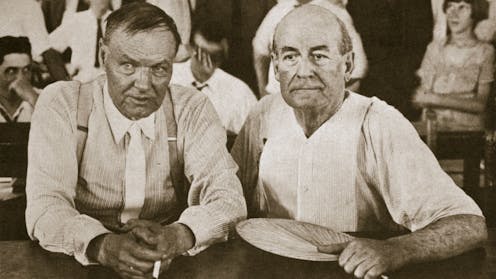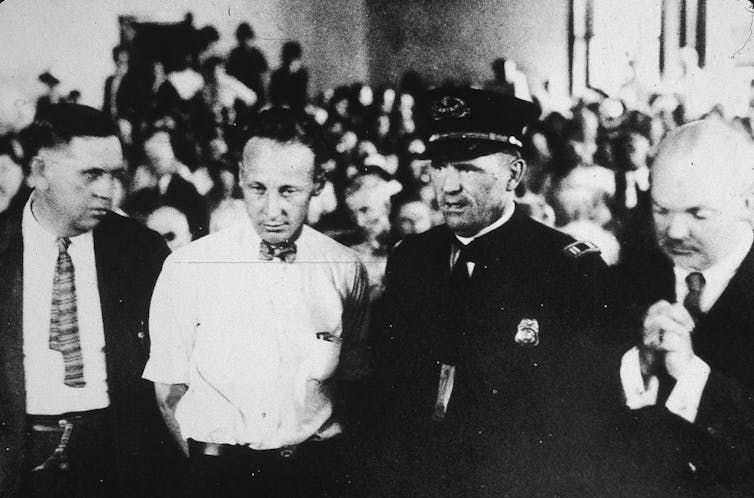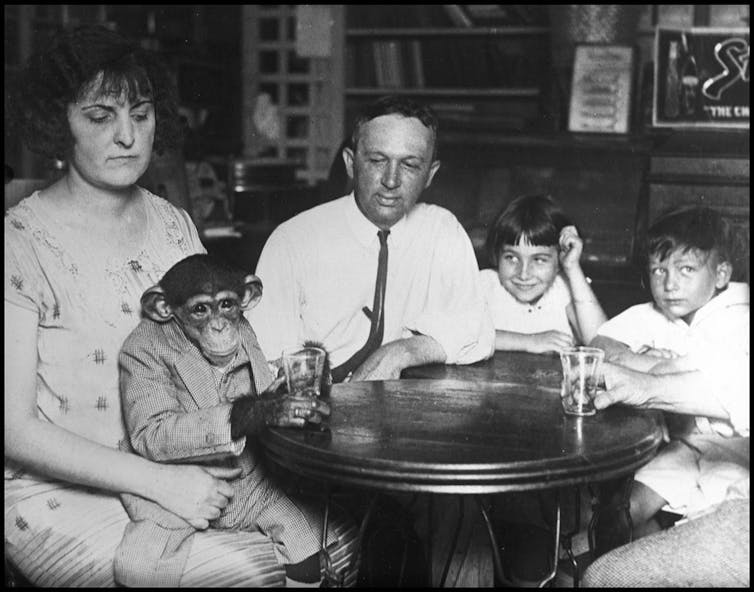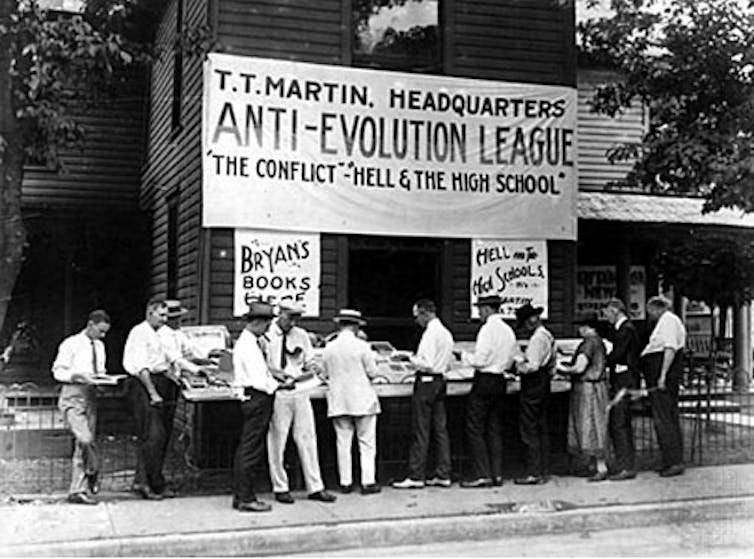‘Monkey Biz-ness’: Pop culture helped fan the flames of the Scopes ‘monkey trial’ 100 years ago − and ever since
- The Scopes trial, held in Dayton, Tennessee in 1925, was a highly publicized “monkey trial” that pitted creationism against evolution, with Clarence Darrow representing the pro-evolution side and William Jennings Bryan leading the prosecution.
- The trial was sparked by the passage of the Butler Act, which prohibited teaching evolutionary theory in public schools, and was largely seen as a publicity stunt to generate economic activity in the town.
- The trial drew national attention, with over 200 journalists attending and updates being broadcast live via radio, and its outcome had significant implications for the debate on evolution and creationism in the United States.
- The Scopes trial has become a cultural touchstone, with references to it appearing in popular culture, such as songs like “Monkey Biz-ness” and films like “Inherit the Wind,” which powerfully defended free speech and criticized religious fundamentalism.
- Today, Dayton celebrates its connection to the Scopes trial, hosting events to commemorate the centennial anniversary of the trial, and has become a popular tourist destination for those interested in American history and culture.

Ask Americans about the Scopes trial, and they might have heard of it as the “trial of the century,” a showdown over teaching human evolution.
Less well known are its origins. As historian Edward J. Larson observed in “Summer for the Gods,” his Pulitzer Prize-winning book: “Like so many archetypal American events, the trial itself began as a publicity stunt.”
Held during July 1925 in the tiny railroad town of Dayton, Tennessee, located not far from the public university where I teach Appalachian studies, the trial was a “stunt” prompted by the state legislature’s passage of the Butler Act, which forbade educators in public schools from teaching “any theory that denies the story of the Divine Creation of man as taught in the Bible, and to teach instead that man has descended from a lower order of animals.” Tennessee was the first state to enact this type of legislation.
This “monkey trial” – so dubbed by journalist H. L. Mencken, for humans’ common ancestor with apes – exposed a cultural rift in the United States, as many Christians wrestled with how to reconcile biblical beliefs with Charles Darwin’s theory of evolution. That rift would be widened by media coverage and national response. Over the past century, collective memories of the trial, as interpreted through music, film and literature, have proven a bellwether of the ongoing “culture wars” in American society.
Publicity stunt
In Tennessee, support for the Butler Act was hardly universal. Not in favor was George Rappleyea, manager of a Dayton-area coal and iron mining operation. Rappleyea lobbied other community leaders, some of whom supported the new law, to collectively stage a trial, hoping media attention would generate economic activity in the town.
Those instigators approached John T. Scopes, a social science and math teacher at the local public high school who had also substitute-taught some biology lessons. The 24-year-old could not recall if his lectures had in fact violated the Butler Act, but the textbook in use at his school included evolutionary theory. Scopes agreed to participate.
Testifying against their teacher were three students who had clearly been coached to do so. Nevertheless, the presiding judge persuaded the grand jury to indict.
As an early indication of outside interest, Paul Patterson, the publisher of The Baltimore Sun, paid Scopes’ bail, and the ACLU announced it would defend him.
Center of the storm
Arguments started on July 10, 1925, at the Rhea County Courthouse. The trial may have begun as a determination of whether Scopes had violated the Butler Act, but both sides soon focused on debating the relative merits of biblical cosmology versus Darwinian theory.

Hulton Archive/Getty Images
Representing the creationist perspective was prosecuting attorney Tom Stewart, a future senator from Tennessee. Special counsel William Jennings Bryan, a former U.S. secretary of state, was included on the prosecution team at the behest of a Christian fundamentalist organization.
The evolutionary theory position was argued by prominent trade union lawyer Clarence Darrow. An agnostic who distrusted religious fundamentalism, Darrow wrote that “there was no limit to the mischief that might be accomplished unless the country was aroused to the evil at hand.”
A circuslike atmosphere enveloped Dayton. Embodying the “monkey trial” was the performing chimpanzee Joe Mendi, whose trainers posed him for photographs around town. More than 200 journalists attended the trial, with articles appearing in The New York Times, The New Yorker and other publications around the nation.

Looking Back at Tennessee Photograph Collection, 1890-1981/Tennessee State Library & Archives
Receiving the most attention was Mencken, whose reportage for The Baltimore Sun did not attempt to disguise his bias against the cultural values of rural America. Dayton’s people, he wrote, “are simply unable to imagine a man who rejects the literal authority of the Bible.”
Updates were circulated in real time via radio – the first U.S. trial to be broadcast live nationally. Filmed footage was rushed from Dayton to be shared in the nation’s theaters as newsreels.
The trial ended on July 21, 1925, with a conviction and a fine. Scopes’ conviction was eventually overturned on a technicality. Since the trial had not challenged the legality of the Butler Act, however, that law remained on the books in Tennessee for more than four decades.
‘Monkey Biz-Ness’
Commenting on the Scopes trial were two 1925 recordings by major singers of the day: a comedic jazz ditty entitled “Monkey Biz-Ness (Down in Tennessee),” performed by the International Novelty Orchestra with singer Billy Murray; and the country hit “The John T. Scopes Trial (The Old Religion’s Better After All),” sung by Vernon Dalhart. The latter song’s lyrics, composed by Carson Robison, warned listeners that “you may find a new belief, it will only bring you grief.”
Other songs of the era – with titles such as “The Bible’s True,” “You Can’t Make a Monkey Out of Me,” “You Talk Like a Monkey and You Walk Like a Monkey” and “Ain’t No Bugs on Me” – echoed that same line of thought: “rural” skepticism toward the “urban,” pro-science perspective on the origins of humankind.

Mike Licht/Flickr via Wikimedia Commons, CC BY
Whereas Scopes was the subject of ridicule in those songs, he and his defenders were celebrated as heroes in “Inherit the Wind,” a 1955 Broadway play by Jerome Lawrence and Robert Edwin Lee. A fictionalized portrayal of the Scopes trial, the play powerfully defended free speech – veiled criticism of Sen. Joseph McCarthy’s recent investigations of various American citizens for their political positions and beliefs.
“Inherit the Wind” inspired a 1960 film of the same name, directed by Stanley Kramer. Its “fanaticism and ignorance” speech depicts the character based on Darrow – played by Spencer Tracy – arguing that without science, society would regress back to a time of unconstrained bigotry. The film received its debut American screening in Dayton on the 35th anniversary of the end of the Scopes trial; Scopes himself was the guest of honor.
Representations of rural Tennessee in popular culture depictions and in media coverage of the trial drew from a font of stereotypes about Appalachia that have continued into the present century. Condescending depictions of the region have been present in American culture since before the Civil War.
Centennial commemoration
Memory of the Scopes trial endures in popular culture. Take, for instance, a reference in Bruce Springsteen’s 1990 song “Part Man, Part Monkey,” or Ronald Kidd’s 2006 “Monkey Town,” a historical novel for young adults.
Dayton did benefit from the notoriety of the Scopes trial, thanks to sustained cultural tourism. Proud of its unique history, the town today boasts a historical marker to alert passersby to the significance of the landmark event that took place in the Rhea County Courthouse. And in 2025, Dayton has been hosting a series of events to commemorate the trial’s centennial.
Back in 1925, even the Baltimore journalist Mencken begrudgingly praised Dayton and its townspeople, admitting, “It would be hard to imagine a more moral town than Dayton.”
“I expected to find a squalid Southern village … What I found was a country town of charm and even beauty,” he wrote.
![]()
Ted Olson does not work for, consult, own shares in or receive funding from any company or organization that would benefit from this article, and has disclosed no relevant affiliations beyond their academic appointment.
